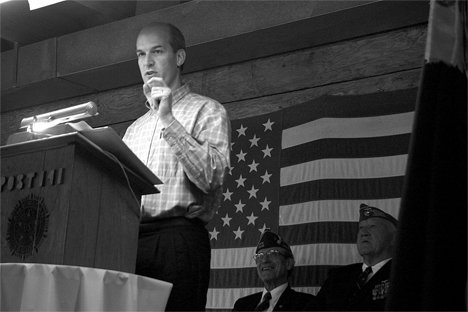Despite a drawdown of troops that is expected at the end of the “surge” of U.S. forces in Iraq, American soldiers will likely be in Iraq for another 10 years, Congressman Rick Larsen said.
Larsen, a 2nd Congressional District Democrat and a member of the House Armed Services Committee, said testimony during a recent hearing on the status of training Iraqi Security Forces indicates there will be a continuing U.S. military presence in Iraq even after the number of combat brigades starts to dwindle.
The House Armed Services Committee held a hearing on the status of Iraqi forces on Jan. 17. It coincided with a just-released report by the committee’s Subcommittee on Oversight & Investigations that noted the U.S. has already spent
$19 billion on developing the Iraqi Security Forces, but those forces were not capable of taking over security of the country, and that “violence has not significantly decreased across Iraq.”
The report also said it was difficult for Congress to get information from the Department of Defense on the capability of the Iraqi Security Forces that have been trained, though the numbers of troops trained are often cited by the Pentagon.
The status of Iraqi Security Forces is vital in the drawdown of U.S. troops, as Pres. Bush has said American troops will be pulled out after Iraqi forces are ready to take over the job of securing the country.
But even as the U.S. pulls out its combat troops, Iraq will still be reliant on the U.S. for logistics, communications and air support, Larsen said.
“It’s going to be five or 10 years before the Iraqi military can supply and arm itself,” he said.
A continuing challenge, Larsen said, is the lack of mid-level officers and higher ranking non-commissioned officers in the Iraqi Security Forces. The Iraqi force is an army of privates and generals and not much in between, Larsen said.
“You have a hollow army. It’s a major problem,” he said, recalling the testimony at the hearing of Army Lt. Gen. James Dubik, the commander of the Multi National Security Transition Command-Iraq.
“Gen. Dubik said it could be 10 years before we fill that gap. And I have no reason to doubt him.”
Larsen visited Iraq in September and reported that limited progress had been made on training Iraqi troops.
A year ago, he called for a partial recall of American troops and increased training of Iraqi forces.
Last week, he said it could be a long haul before Iraqi forces can stand alone.
“We’ll be running the logistics and supply and air support for the Iraq military for some time,” Larsen said. “Gen. Dubik said it will be 10 years. I don’t know if we will be doing it for 10 years, but it will be well into the next administration.”
Larsen agreed with the subcommittee report that said the Department of Defense must do a better job of sharing information with Congress on the progress of training Iraqi forces.
“It’s still fairly difficult to get the numbers based on how we would assess their progress and their capabilities, their ability to do their job,” he said.
“I can tell you want the military will tell us. Publicly, they are reluctant to share more specific numbers because of the impact on morale of the Iraqi Security Forces being trained,” Larsen said.
“The argument is, you don’t want to go out there and say Battalion A is really well trained and ready to do the job, but the guys in Battalion B are really a bunch of mess-ups.”
Also, it’s important to keep such information from an enemy that may exploit the information. “You don’t want to let the bad guys know what your own assessment is of these particular forces,” Larsen explained.
Even so, Larsen said Congress must fulfill its duty to provide oversight.
“It’s still the Whidbey Island taxpayers’ dollars that are paying for this; it’s still Congress’ job to get specific answers,” he said.



